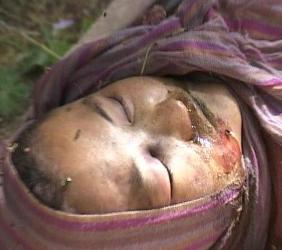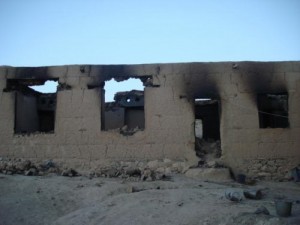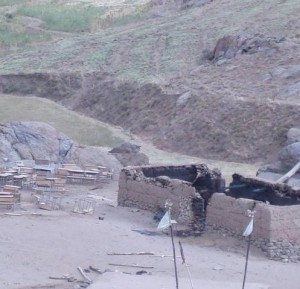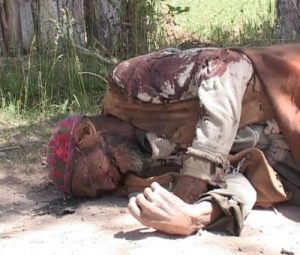Hillary Clinton, Barack Obama throwing democracy’s best friends in Afghanistan under the bus
Genocide of Hazaras in Behsood ignored by Afghan government and its international supporters
Tuesday 25 May 2010, by M. Amin Wahidi, Robert Maier
Afghan President, Hamid Karzai recently returned from a red-carpet visit to the U.S., but the Hazaras apparently were never mentioned. No wonder, since Afghan National Army units have been seen assisting the Taliban-backed Kuchi in their violent looting, and forced removals from the Hazara’s rightful lands in Behsood and Daimirdad.
Several weeks ago, an organized and well-armed Kochie nomads, probably assisted by Afghan-government supported Taliban fighters secreted over the Pakistani border, wrecked farms, burned homes, murdered men, women and children, and killed livestock in the Hazara heartland. This attack, now becoming an annual occurrence has been virtually neglected by the English language press.
Demonstrations in Kabul, other areas of Afghanistan, and various foreign capitals, have tried to focus international attention on this assault, which reveals some of the most negative aspects of the West-supported Karzai administration. However the U.S. Military and State Department evidently don’t want to hear it, because it doesn’t fit their fantasy script for Afghanistan. Kabulpress.org’s postings calling attention to the situation on ISAF/NATO and U.S. State Department Facebook pages have been deleted.
Given the many billions of dollars and lives destroyed or interrupted in the West’s military and civilian efforts to bring peace and justice to Afghanistan, the history and facts in this case bear intense scrutiny.
The Drug Cartel and Ethnic Discrimination in Afghanistan
Afghanistan has faced social and political crises for decades. It has been occupied for eight years by international armies and consultants, but Afghanistan’s structure is still very fragile, so even the slightest, unexpected event could destroy it.
Most of the unsolved problems are the product of issues like poverty, illiteracy, and instability. They have resulted from discrimination and injustice by Afghanistan’s various governments. However, deliberate actions by the Afghan government have increased the problems.
There is substantial ethnic discrimination and corruption in Afghanistan’s administration, which is sanctioned by teams assembled by President Karzai, himself. There is no apparent effort to solve this problem. The government lacks accountability and responsibility. Efforts by the international community are met by official roadblocks, so their work is severely hampered. Even Afghanistan’s military partners are not to be trusted by NATO forces.
Afghanistan’s Eastern and Southern provinces have become the exclusive domain of drug lords and their opium poppy plantations. This problem increases daily, because senior government officials, including provincial governors appointed by the president and the president’s family members, lead Afghanistan’s drug cartel. Therefore, despite the government’s claims, there are few, if any, serious efforts made by the government to eradicate opium cultivation. Even President Karzai’s brother is seriously implicated in Southern Afghanistan’s drug empire.
Additionally, Taliban insurgents fortify themselves using drug money earned in their partnership with the government. The drug money finances the fight against the people of Afghanistan and the international community, which then increases the need for troops in our country, and enables a longer and larger disruptive military presence. This sucks up money that should be used to improve infrastructure, support education, grow an honest judiciary, create seed money for small businesses, and provide urgently needed medical care.
The anti-drug cartel Hazaras
Of all Afghan regions, the central highlands of the country, the Hazarajaat, has been the most peaceful, and therefore somewhat ignored by the soldiers and NGOs. Its people are primarily farmers and livestock herders and have cooperated with the government and international agencies in the democratizationof the country. Its current governor is the first woman governor in the history of Afghanistan. These people, instead of cultivating opium to support terrorism and war, have been planting wheat, vegetables, and potatoes to develop products needed by Afghanistan to build an honest, democratic economy.
Because of its peaceful, cooperative attitude, the Hazarajaat shows great potential for attracting reconstruction and re-development efforts and money. But unfortunately Karzai’s government has discriminated against the Hazarajaat. For example, the reconstruction of the Kabul-Bamyan-Herat highway, promised by the Karzai government, which could improve tourism and shorten distances between the western provinces, the central highlands, and Kabul, has not been implemented after almost four years.
The ancient site of Bamyan with its cultural, historical and natural treasures is capable of luring travelers from all around the world, even though its famous Buddahs were blown up by the Taliban in 2001. However it has not been re-constructed, nor has its infrastructure been properly developed, which hinders tourism development in this comparatively peaceful part of the country.
Imposing war against the Hazaras
The Hazaras in Afghanistan are great supporters of democracy and social justice, because they are tools to help eliminate the discrimination they, as a people, have suffered for too many years. Among the Hazaras, education and freedom for women, involvement of women in social and political issues, and literacy for all, are being pursued more ambitiously than in any other part of Afghanistan. This openness has marked them by autocratic fundamentalists throughout Central Asia and certain Arab countries as Afghanistan’s historic victims who have suffered discrimination, oppression, torture, obligatory displacements, and genocide for at least for one and half centuries.
The Taliban always considered the Hazaras to be one of their main enemies. Under Taliban rule, the Hazaras faced genocide for the second time in modern history. This genocide was a continuation of the same genocide they faced in 1880s and 90s by Amir Abdul Rahman Khan, the Pashtoon tyrant king who killed 62 % of the Hazara population and forced many to flee to neighboring countries. The Hazaras have always opposed the return of the Taliban to Afghanistan’s political arena, but since the Karzai administration needs the Taliban’s ethnic support, the return of the Taliban is continually supported by the government. The vigorous opposition of the Hazaras to this policy explains the administration’s on-going anti-Hazara discrimination.
Given the basic ethnic tribal structure of Afghanistan, it is essential for the government to assist and unite every ethnic group to create a strong, just nation.
The Karzai administration, has failed in this unification effort. However, to fortify its power, it has adopted a policy of impunity for the Taliban, in support of the Pashtoons. This occurs, despite five years of crimes against humanity the Taliban have committed since the arrival of coalition forces.
The Taliban, who should have been prosecuted and tried for war crimes, are shielded by the current Afghan government. It encourages the international military in Afghanistan to fight Taliban insurgents. On the other hand, it allocates large sums of money to the “forgiveness commission,” which releases Taliban from prison and pays them large amounts of money as compensation. The released Taliban misuse these favors, then return to the front lines to battle against the government, Afghan civilians, and coalition soldiers.
This is not the end of the traitorous deals. The government also supports the Taliban’s opium production with drug-related deals involving senior governmental officials including family members of the president in Kandahar. These people get rich off the drug trade, and when it finally blows up in their face, will escape to their villas in the Mediterranean, California, New York, and the Washington, D.C. suburbs, protected by big bank accounts in Switzerland, the US and Dubai.
Next year’s presidential and parliamentary elections are forcing the Karzai administration to seek Taliban support, while encouraging ethnic conflict to distract normally peaceful, democratic regions from the electoral process.
Taliban attacks on Hazaras in the name of the Kochies (nomads) Within last two to three years, using the name of The Kochies (Nomads) the Taliban have begin their attacks on Hazarajaat by the support of specific senior governmental officials within the Karzai administration team as a result they have killed people and livestock, burnt many houses, schools, and forced thousands of people including the women, the elderly and children to obligatory displacement in Behsood district Maidan Wardak province.
Who are the Kochies (nomads)?
The Kochies or the “nomads” are the poor and unfortunate people who have been kept illiterate and vagabond for years and years by Pashtoon politicians and are often misused for political purposes by them, even if these purposes harm the identity and the reputation of the Kochies.
During 1880s and 90s when the Hazaras faced genocide and obligatory displacement by Abdul Rahman Khan the tyrant king, he used the Kochies to pressure the Hazaras and issued a decree that permitted Kochies to be armed with guns and pistols. He also granted them the right to use Hazara land for summer grazing their animals. This has caused the Hazaras substantial agricultural and economic loss every year since. During the Taliban rule, these nomads, using the power and influence of the Taliban even received taxes from Hazarajaat.
This agricultural land had been the only livelihood of the Hazaras for hundreds of years. And it had been taken without compensation by an armed group—as a genocidal tool, against all international human rights conventions. Thinly covered Hazara lands cannot sustain nomadic over-grazing.
Disadvantages of nomadic life style for modern Afghanistan
We live in the twenty-first century, in 2010 when the world is rapidly advancing. Nomadic life that descends upon settled communities with armed violence, disrespect of law, and abuse of resources only hinders the improvement in the quality of life sought by productive, settled communities seeking the rule of law, not the AK-47.
Afghanistan currently suffers from the empowerment of religious extremists fueled by waves of violent insurgents over Pakistan’s weak border. The Kochis are supported and encouraged by these foreign insurgents to attack the more progressive Hazaras, adding to the already unstable situation in Afghanistan. The uncontrolled ravaging of the Hazara grazing lands also creates major environmental problems of erosion and loss of an important natural resource to Afghanistan. It is time for the disarmament of the Kochies, which is the law for other Afghan ethnic groups. Article no. 22 of the Afghan constitution prohibits any discrimination and distinction among Afghan citizens, and says that all share the same rights and responsibilities according to law.
It is time to seek a permanent solution to the nomads’ issue by settling them in appropriate locations provided by the government based on article no. 14 of the Afghan Constitution that obliges the government to assist the Kochies to settle in a permanent location. The Kochis have been assigned permanent, productive lands, but they are also happy to graze their herds on the lands of others, if they can get away with it.
Kochis should not be settled in a land that has been populated by another ethnic group for many hundreds of years, especially lands held by an ethnic group in opposition to certain government policies. This must not be a political decision favoring the current ruling powers. The evergreen land of Mashriqi the eastern provinces and the tropical southern provinces which have a lot of forests and greenery is a suitable place for the permanent location of the Kochies.
Additionally, all discriminating decrees and documents that were issued more than a century ago for the purpose of genocide and obligatory displacement of the Hazaras in Afghanistan should be immediately rescinded.
A call to action against Genocide in Afghanistan
We ask world governments, and especially NATO members to firmly petition the Afghan government for the absolute annulment of the discriminating decrees from more than a century back that causes violence and extends ethnic enmity, bloodshed, genocide and obligatory displacement of people in certain parts of Afghanistan.
We hope this committee would continue its struggles and efforts for the realization of social justice in Afghanistan. We welcome the cooperation of all nations in expressing outrage and the violence supported and enabled by a drug cartel which has no desire to improve the lives of the people of Afghanistan and have them take a rightful place in the modern world.
Related report:








Naseem Hazara
Stop begging, just fight back even with handmade weapons.
Leqa Dai Miraki
salam da akartai qawmo..
First of all,we really need a great leader like Ustad Abdul Ali Mazari to make all hazara united. Secondly we need to have economy. Thirdly we need dictatorships commanders. and after all of this we must attact and kicked them out of our area and burn their house and we must burn them in boil water.
thanks.
Proud to be Hazara.
pashtune khar ech wakht da hazara namosha,,nabayat da har kosti zan rai beti.
Changazi
Salam Qauma
Only way we can stop this!
WE must have to be united
secondly we need a great leader like Hitler!
Then for sure we can stop and this shit…..and make our future save and secure!
Proud 2b hazara
hazara zindabad
Michael
“DO NOT FOLLOW OUR ENEMIES OTHERWISE WE WILL NEVER SURVIVE”
Hazaras are victims of the blame game in Afghanistan
The Taliban persecute Hazaras, but this is ignored by the US as it doesn’t fit the script fed to them by their Afghan sycophants
Kamran Mir Hazar
guardian.co.uk, Monday 19 July 2010 14.00 BST
Article history
I remember it was 2006 when a former Kabul police chief, General Ali Shah Paktiawal, told local media that the police had detained a Hazara suicide bomber before he had a chance to detonate the bomb in front of Sarai Shahzada Exchange Market. The general appeared very pleased with himself as he posed in front of the international news cameras.
This was before an investigation and a search of the detainee. It turned out that the young Hazara man was carrying several bottles of drinking water under his clothes to deliver to his girlfriend. Security officers told me that Ali Shah Paktiawal didn’t question the fact that not a single Hazara had ever been accused of a terrorist act of any sort, much less a suicide bombing. The former chief never even met the young man, but wanted to take the opportunity to show how successful the police were.
Four years later, a senior Afghan officer in Helmand, General Ghulam Farook Parwani, alleges that the killer of three British soldiers used a rocket-propelled grenade. He described the attacker as a member of the Shia Hazara from Ghazni province.
Most international media outlets published this news without noting how unusual it was that an ethnic Hazara, who are generally reviled by fundamentalist Pashtuns, would be doing their bidding. The general’s claim reminded me of Ali Shah Paktiawal’s earlier speech that was so quick to defame the Hazara people, before any investigation into the event. Such declarations are mere ethnic propaganda that has been a common tactic of Afghan officialdom’s efforts to turn international forces against the Hazara people.
You cannot find any statement by the general or other Afghan officials that is so quick to identify a terrorist as Pashtun. All Afghanistan knows that 99% of the Taliban are Pashtun. But when it comes to terrorist ethnic labelling, it is the Hazara who are specifically named by government officials. How fair is that?
To think that a Hazara man would be welcomed and protected by the Taliban is a fantasy. On 24 June, it was reported that at least nine Hazaras were assassinated by the Taliban in Uruzguan, a province dominated by Pashtuns.
It is easy to see that the Taliban are following a successful strategy. On one side they commit war crimes, killing thousands of civilians and fighting against international troops. On the other side they have a big supporter who happens to be the president of Afghanistan. This man, Hamid Karzai, addresses their leader as “my dear Mullah Omar” and is making a great effort to remove important Taliban members from the UN blacklist. He is bringing the Taliban into the Afghan government, and giving them control over key government ministries such as finance, defence, interior, parliament, and justice.
These Taliban cronies are changing laws in order to quash human rights, promote fundamental religious intolerance, and provide secure information regarding coalition military plans and activities to their Taliban brothers in arms – those very same people who are killing young American and British soldiers.
And now these same Afghan officials have mounted a huge propaganda campaign against the Hazaras. These are the Hazara who face continuing massacres by Taliban and their agents.
In May, the Hazaras faced a bloody attack by Kuchi-Taliban thugs in the Behsood and Daimirdad districts and thousands were forced to flee. This triggered world-wide demonstrations, but was essentially ignored by the US media because it did not fit the script fed to them by their Afghan syncophants. Similarly, thousands of Hazaras were massacred by Taliban in Mazar-i-Sharif, Yakaolang and Robatak Pass. This was documented by Human Rights Watch and the Afghanistan Justice Project:
“Almost immediately after the Taliban took control of the city, the new Taliban governor, Mullah Manan Niazi, delivered speeches at mosques throughout the city, threatening violence against Hazaras in retaliation for the killing of the Taliban prisoners in 1997, warning them that they should convert to the Hanafi Sunni sect or leave the city, or face the consequences, and threatening punishment for anyone who tried to protect Hazaras. In another speech he reportedly said, ‘Hazaras are not Muslim, they are Shia. They are kuffar [infidels]. The Hazaras killed our force here, and now we have to kill Hazaras.’
As Human Rights Watch noted: “These speeches, given by the most senior Taliban official in Mazar at the time, clearly indicate that the killings and other attacks on Hazaras were not the actions of renegade Taliban forces but had the sanction of the Taliban authorities.”
In recent years Hazaras have been facing discrimination by the Afghan government but they are great supporters of human rights and democracy, and they know the only way to improve their lives is through education. They are not against women’s rights, they elected a female governor and mayor. Approximately 50% of students in the Hazara districts are girls, which far exceeds other areas in Afghanistan. Many Hazara girls attend schools constructed and run by local people with no national governmental support at all.
Consider the following warning letter from the Taliban to a female teacher. Is this not a warning to Hazaras too?
“You [name removed] teaching at [name removed] School which is a girl’s school. You should be afraid of God. We warn you to leave your job as a teacher as soon as possible otherwise we will cut the heads off your children and will set light to your daughter. We will create a situation that you will regret.”
yaseen azad
how we can stop…?????